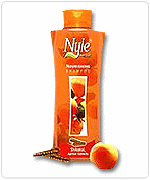I’m not too fond of store-bought shampoos, not even the herbal ones. By and large, I prefer washing my hair with homemade herbal shampoos; preferably the ones with Amla , Shikakai and Reetha powder -- these have helped me a great deal in keeping my hair healthy and also in preventing hair-loss.
And oh! How can I forget those wonderful homemade after shampoo hair rinses? Especially the decoction that you get after boiling fruit pieces of amla (gooseberry) works out to be a great hair rinse. So never forget to use after shampoo hair rinses after washing your hair – they impart bounce and shine to your hair.
You might try some of these conditioners also.Still, when I do run out of these dry shampoo powders I go and purchase one of those herbal or chemical shampoos, I happened to try Pantene Sleek and Shine Shampoo with conditioner a few days ago and it wasn’t bad.

Nyle Herbal Nourishing Shine Shampoo.
(with Shikakai and Apricot extracts)
Recently while browsing through a shopping mall, a quaint little bottle caught my attention. It was a pale orange, colored shampoo bottle; the name read ‘Nyle Herbal Nourishing Shine Shampoo’.
I picked it up and casually went through the details. It read: “New Nyle Herbal Shine Shampoo is enriched with extracts of natural ingredients like Amla, Shikakai and Apricot, which nourish your hair and make it extremely soft and shiny. Go on; indulge in its smooth texture, rich lather and natural fragrance.”
I purchased it and have been using it for past few months. It does clean my oily hair really well and am not losing hair excessively these days. It does tend to make it a bit dry afterwards; most shampoos do (could be due to the presence of SLES, that works up a rich, foamy lather in a product) if I forget to use an after shampoo rinse/conditioner. Overall I think it’s not a bad product.
See also:
And oh! How can I forget those wonderful homemade after shampoo hair rinses? Especially the decoction that you get after boiling fruit pieces of amla (gooseberry) works out to be a great hair rinse. So never forget to use after shampoo hair rinses after washing your hair – they impart bounce and shine to your hair.
You might try some of these conditioners also.Still, when I do run out of these dry shampoo powders I go and purchase one of those herbal or chemical shampoos, I happened to try Pantene Sleek and Shine Shampoo with conditioner a few days ago and it wasn’t bad.

Nyle Herbal Nourishing Shine Shampoo.
(with Shikakai and Apricot extracts)
Recently while browsing through a shopping mall, a quaint little bottle caught my attention. It was a pale orange, colored shampoo bottle; the name read ‘Nyle Herbal Nourishing Shine Shampoo’.
I picked it up and casually went through the details. It read: “New Nyle Herbal Shine Shampoo is enriched with extracts of natural ingredients like Amla, Shikakai and Apricot, which nourish your hair and make it extremely soft and shiny. Go on; indulge in its smooth texture, rich lather and natural fragrance.”
I purchased it and have been using it for past few months. It does clean my oily hair really well and am not losing hair excessively these days. It does tend to make it a bit dry afterwards; most shampoos do (could be due to the presence of SLES, that works up a rich, foamy lather in a product) if I forget to use an after shampoo rinse/conditioner. Overall I think it’s not a bad product.
There are 2 other variants of Nyle Herbal Shampoo. One has extracts of reetha and chamomile, while the other has Aloevera Tulsi (Basil) & Green tea. I haven’t tried these, but if any of you have, do share your experiences with these shampoos in the comments below.
See also:
Nyle offers a range of shampoos with pure herbal extracts such as shikakai, amla and reetha. Shikakai is known for cleaning and anti-dandruff properties, amla is known for blackening hair and reetha, a gentle cleanser, makes the hair soft and shiny.
ReplyDeleteApart from being among the safest shampoos to use, Nyle offers nourishment to the hair right from the roots. Its unique herbal formulation makes it mild enough for daily usage. It maintains the natural moisture content, shine and gleam of hair
Nyle herbal nourishing shampoo Orange in color . Wow This is great.
ReplyDeleteThis is a great product that really does works. It's not a miracle cure, but it does what it says it does, which is stops hair loss and thickens your existing hair. Overall, very satisfied with the site as well as with the product. Honestly, my hair does look better because of this product.
ReplyDeleteI Have tried all three all of them are good. Have been using this brand since I was a child.
ReplyDeleteOf course I anyway luved the older Nyle. They also came up with this Nyle Root Strenghtening shampoo but they don't have the 900ml 1.
After using Nyle Shikakai Shampoo, It leaves my hair with natural shingling and smooth looking! Highly recommended!
ReplyDeletewhich type of nyle shampoo is best for curl and dry hairs?
ReplyDelete